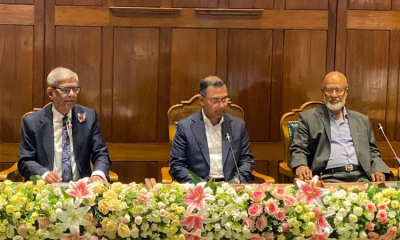Some 22 eminent citizens of the country have demanded the repeal of the Digital Security Act (DSA) amid growing criticism over the law.
They have also demanded the immediate withdrawal of the DSA cases against Prothom Alo Editor Matiur Rahman and reporter Samsuzzaman Shams, in a press release issued on Thursday.
The eminent citizens have also called for the release of Samsuzzaman from jail.
“We note with concern that following a recent news report published by Prothom Alo, reporter Shamsuzzaman was picked up from his residence in the middle of the night and subsequently arrested in a case under the controversial Digital Security Act,” said the statement.
“Without taking the protests of the journalist community and various sections of the society into account, another case was filed under the Digital Security Act against the Editor of the newspaper, Matiur Rahman, based on the same news on March 29, 2023 midnight,” it adds.
“We express our deep concern and outrage over the case against Editor Matiur Rahman and the arrest of reporter Shamsuzzaman Shams,” the statement reads.
The eminent citizens said that these incidents have set yet another alarming example of the misuse of the DSA to suppress freedom of expression and independent journalism.
“Cases and arrests are being made under this act without taking the opportunity to resolve conflicts through the Bangladesh Press Council over complaints against journalists, and it appears that the intent is to curtail the free flow of journalism in Bangladesh,” the statement reads.
The statement also said that on March 22 Naogaon land office employee Sultana Jasmine was arrested by RAB following the complaint under the same Digital Security Act and later her death in RAB custody caused widespread outrage.
“Even after such a tragic incident, the misuse of the Digital Security Act does not stop, which was proved once again by the arrest of news reporter Shamsuzzaman Shams,” the statement adds.
The statement was signed by Dr Zafrullah Chowdhury, Trustee, Gonoshasthaya Kendra; Dr Hossain Zillur Rahman, economist; Dr Hameeda Hossain, human rights activist; Khushi Kabir, coordinator, Nijera Kori; Shaheen Anam, executive director, Manusher Jonno Foundation; Dr Iftekharuzzaman, executive director, Transparency International Bangladesh; Dr Badiul Alam Majumdar, editor, SUJAN and others.
The DSA was enacted in 2018 to provide cyber security to citizens, but its wide scope and vague provisions are being exploited for more nefarious purposes.
Human rights defenders have repeatedly highlighted that the act can be used as a weapon to muzzle contrarian voices from exercising their freedom of expression, particularly the press, but this is only the tip of the iceberg of problems that it poses. The act can be abused to harass anybody from any profession, not just journalists.
The most dangerous aspect of the DSA is the wide range of offences it considers cognizable and non-bailable. Such offences allow police to conduct an investigation and carry out an arrest without an order of the court or warrant, and the accused has no choice but to languish in jail until he is tried.
Even if the case is eventually dismissed, the damage has already been done.












-20260217073221.webp)




-20260216115008.webp)














